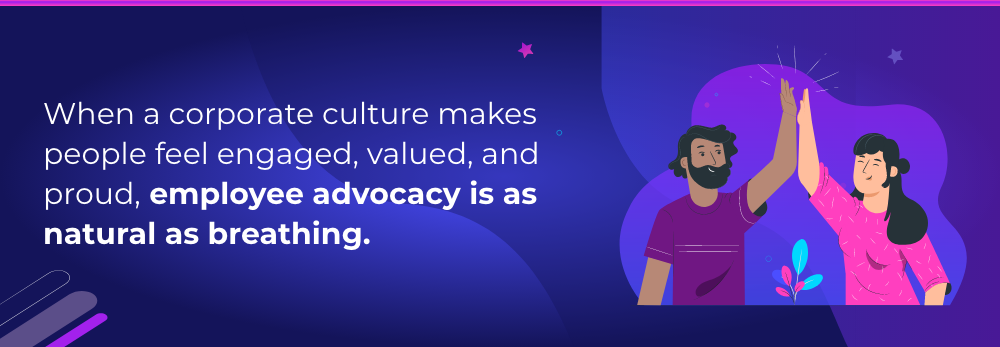Employee Advocacy: Why Are Your Employees the Most Authentic Reflection of Your Culture?
Written by María Eugenia Raffaele
When your employees become your brand ambassadors, you get the chance to take your culture ‘inside out’, not only to attract, retain and engage top talent, but also to show the world who you really are as a company.
Why is employee advocacy so important for HR? Here’s why: The essence of your brand is not your slogan or tagline, it’s the things that really happen inside your company. People no longer believe in statements like: “creating a better world”, “empowering people to live life on purpose”, “you can be yourself with us”, unless they are truly represented in the organizational culture and employees’ daily experience.
So, the first question I’m going to ask you is: How much do you know about your employees? If you can get real visibility of their needs, daily behaviors, connections and feelings, look closely around you.
Take your time…
Do they carry your corporate values with them and transmit your culture not only to colleagues, but also to family and friends? If they do, it means your organizational culture makes them proud. And that’s what employee advocacy is all about.
If you’re not very familiar with what employee advocacy means and why you should care about it, I suggest you read on keeping this in mind:

What is Employee Advocacy?
To put it simply, employee advocacy is the promotion of an organization by its very own employees. This trend emerged among Millenials and is getting stronger with GenZ.
Yes, people today need to know what the company’s employees think about the culture they represent to make sure there is genuine transparency and authenticity in what they claim to be and offer.
See for yourself:
- 81% of Millennials state they share information about the company they work for on social media.
- 71% of Millennials are more likely to make an online purchase after receiving peer recommendation.
- 62% of Millennials are more likely to stay brand loyal if they feel engaged by social media.
- 90% of Millennials claim they would quit their job if they began distrusting the organization they work for.
Why Should You Care about Employee Advocacy?
Millennials already make up the largest workforce generation – especially in the US – and GenZ will be entering the job market strongly over the next few years. In terms of recruiting, engaging and retaining your talent you have a great challenge ahead: These generations want to see the true colors behind your company to make sure they want to be part of your culture. So who are they going to listen to in order to figure this out? Your employees.
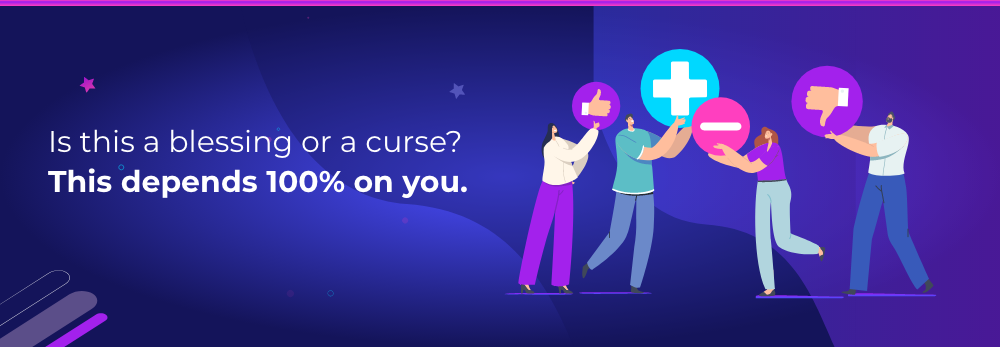
If your employees feel that the culture they are part of doesn’t really care about their professional growth, silences their voice, or is not inclusive enough, no matter what your slogan states, they will shout out that your organizational culture is merely pie in the sky… Results? You’re likely to find it hard to recruit valuable talent in the future.
However, if your employees feel part of something big and see their values, goals, and expectations reflected in your culture, bingo! They will naturally become your brand ambassadors, and you’ll get a huge competitive edge in the future.
As you can see, employee brand advocacy is something you can’t overlook, and if you need to make any adjustments of transformations at a cultural level, I suggest planning before it’s too late.
How is Employee Advocacy Manifested?
How engaging is your employee experience? When it comes to employee brand advocacy, building a human-centric culture focused on engagement and people connection is key. Why? Because what your people experience is what they will transmit inside and outside your company.
Let’s sneak into the minds of strong, connected and engaged teams:
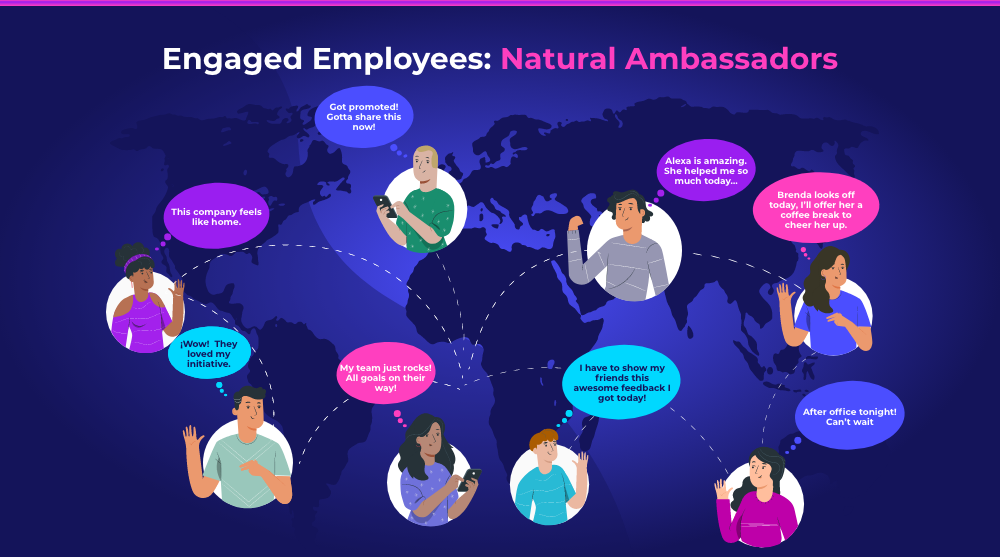
Well, that’s inspiring, right? And what do brand ambassadors actually do in a context where they feel like this? Let’s see some employee advocacy examples:
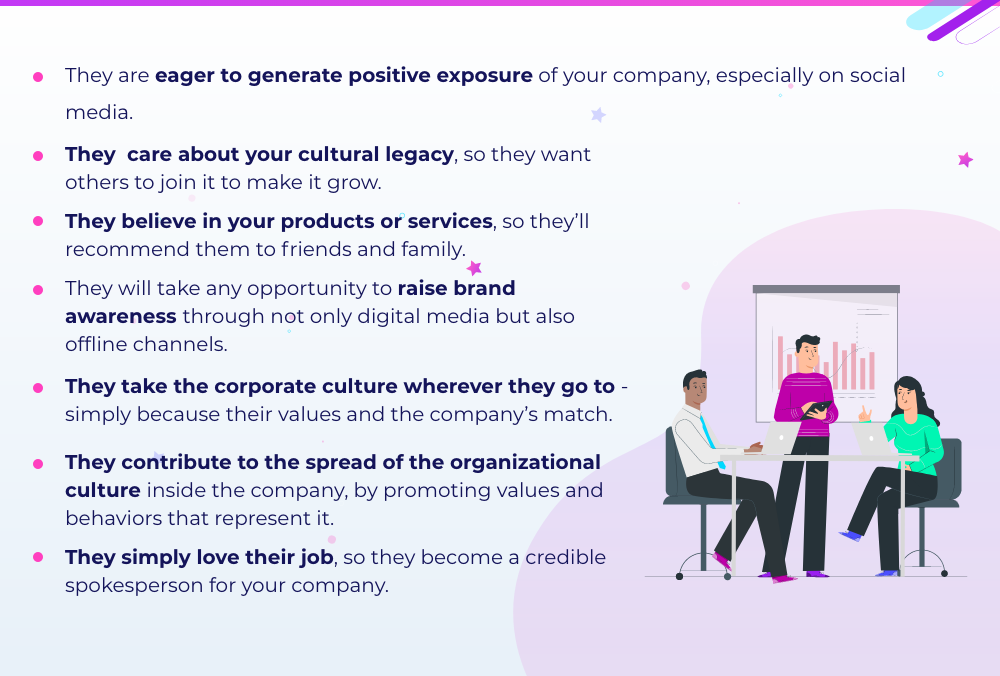
What happens when there’s employee attrition in a company?
On the other hand, when people are not in tune with the organizational culture, their motivation and engagement decrease, affecting the organization inside out.
Speaking of pandemics, dis-engagement is statistically the biggest infection in the corporate world. Why? Behaviors like procrastinating, negative attitudes, less initiative, or distrust, for instance, get easily spread across the community and outside your company – your future employees and potential clients start perceiving your organizational culture as weak and unattractive.
That certainly doesn’t look good, right? What would a dis-engaged person manifest about the company they work for if they feel this way? Remember: Your brand is what your employees feel and say it is. If they do it authentically, it’s real…
How to Harness Employee Advocacy
Ok, so this is the part where controversy comes up. Many companies that are aware of the perks of employee advocacy, plan employee advocacy programs, where they intentionally use KPIs to spot potential brand ambassadors. They offer them special benefits like career goals, and incentives, and train them to post certain content on their social media that would make their company look awesome and competitive.
This begs the question: If we turn something so valuable as employee advocacy – which is supposed to be authentic and real – into a corporate mandate in disguise, aren’t we trivializing the importance of building a genuine human-centric culture? Plus, given the data we previously shared about the generations that make up today’s world workforce, how many employees are likely to jump on board to show or transmit something that is not really true?
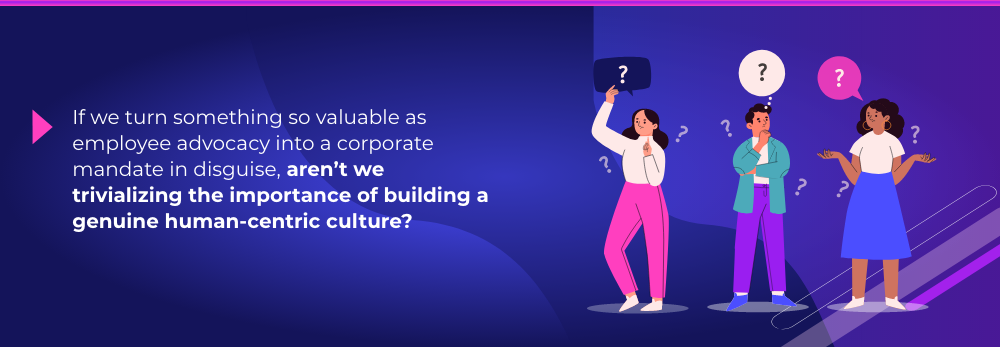
Answer: Just put your greatest effort into building a digital culture people love so that they nurture, protect and stand for it simply because they love where they work, not because you ask them to.
Some Valuable Tips:
If you’re reading this, it means you already care about your culture and are willing to make your employees’ experience unique and meaningful. So, in order to harness employee advocacy and make it flow naturally, just make sure you:
- Make the most of technology to adopt solutions that can really help you get to know your people deeply. Find out how they feel and what they need – the wider the visibility you get of your teams the better you’ll respond to every individual.
- Spot your natural ambassadors – those who are committed to their colleagues and the work they do. Harness your cultural influencers to inspire other talent to join the clan and keep your culture growing.
- If people love their culture, they’ll be eager to share their experience with the world. Thus, give them the chance to propose ideas, projects, drive initiatives, or launch campaigns. Let them lead the way and empower them to make an impact, not only on your company but also on society.
- Organizational cultures are made up of tiny little daily experiences. So capture those moments and turn them into something meaningful and authentic. When we hear people proudly calling themselves ‘Googlers’, or ‘Globers’, it doesn’t mean they are marketing people, they are things that happen.
So What Do Your Employees Tell the World about Your Culture?
I think our position here is clear: By employee advocacy, we’re not talking about ‘using’ your employees as a marketing strategy on social media’. We’re encouraging you, once more, to become aware of the importance to humanize your culture a bit more every day, not to lose track of your people, and stay flexible to adjust to a new world.
